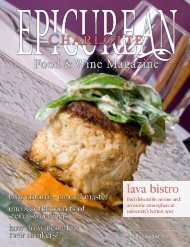señor tequila cantina - Epicurean Charlotte Food & Wine Magazine
señor tequila cantina - Epicurean Charlotte Food & Wine Magazine
señor tequila cantina - Epicurean Charlotte Food & Wine Magazine
Create successful ePaper yourself
Turn your PDF publications into a flip-book with our unique Google optimized e-Paper software.
Extra Virgin olive oil comes from virgin oil,<br />
contains no more than eight percent acidity or free<br />
fatty acid content and is judged to have a superior<br />
taste. Extra virgin olive oil makes up less than 10<br />
percent of oil in many of the producing countries.<br />
Olive oil has for centuries been the most popular<br />
cooking and food oil used in countries around the<br />
Mediterranean. It may have taken the rest of us a<br />
bit more time to catch on, but today, Americans<br />
consume more olive oil than ever before. So back to<br />
the question—when do you use which oil for what<br />
purpose? Does it matter which one I use? Can I mix<br />
and match them? Lest these questions slip through<br />
our fingers like the finest EVOO (extra virgin olive<br />
oil), let’s discuss the uses of the oil from an olive in<br />
the kitchen.<br />
If you put a dozen chefs in a kitchen and asked<br />
the same question about when to use which olive oil,<br />
you may get at least half a dozen different answers.<br />
One point most will agree on is that the finest of<br />
extra virgin olive oils are enjoyed mostly in salad<br />
dressings and cold perpetrations, along with dipping<br />
for bread. That’s not to say that you couldn’t cook<br />
with it; you certainly can, as there are no rules. The<br />
olive oil patrol will not come to your kitchen and fine<br />
you for cooking with what many chefs on television<br />
cook with, EVOO. The important point to remember<br />
is that the more pure the oil, the lower the ‘smoke<br />
point.’ The smoke point is commonly known as the<br />
temperature at which the oil in the pan begins to<br />
smoke.<br />
For lightly sautéed foods, you can really use any<br />
olive oil you wish. As long as you like the way the<br />
oil tastes by itself, you should enjoy the cooked<br />
result, provided you don’t cook at too high a heat<br />
for the oil to where it begins to smoke and break<br />
down. For heavier cooking at higher temperatures,<br />
consider using just virgin olive oil and possibly<br />
mixing in a touch of extra virgin for the flavor<br />
profile. You can also go for a triumvirate and blend<br />
in a little canola oil with the two grades of olive<br />
oil to increase the ability to cook comfortably at<br />
somewhat higher levels of heat, or if you simply<br />
want to adjust the flavor.<br />
The price of a bottle of olive oil varies dramatically<br />
based on the type, quality and country of origin. For<br />
just cooking or even deep-frying, plain olive oil is<br />
the best consideration, as well as being the least<br />
expensive option. Virgin olive oil is less expensive<br />
than extra virgin, and certain producers known for<br />
especially delightful small batch oils can be very<br />
expensive. So how much? It’s the extra virgin that<br />
gets pricey. On the lower end, a bottle of 16 ounces<br />
can cost just eight bucks. You can also find a similar<br />
size container for $50 or more. This is where olive<br />
oil is like wine.<br />
An important consideration regarding olive oil<br />
is storage. The oil has three natural enemies: air,<br />
left: ©iStoCkphoto.Com/mBBirdy; right: ©iStoCkphoto.Com/nightanddayimageS<br />
New in Town...<br />
A <strong>Charlotte</strong> Tradition...<br />
Good <strong>Food</strong> on Montford<br />
1701 Montford Drive<br />
<strong>Charlotte</strong>, NC 28209<br />
704.525.0881<br />
goodfoodonmontford.com<br />
7822 Fairview Road<br />
<strong>Charlotte</strong>, NC 28226<br />
704.364.5755<br />
barringtonsrestaurant.com<br />
Committed to Local<br />
Committed to Independence<br />
Committed to Excellence<br />
A Moffett Restaurant Group, LLC<br />
light and heat. Keeping the container in a cool,<br />
dark and dry location always helps. A smart tip<br />
is to use a small dispenser for olive oil to keep it<br />
Buying the oil in small enough<br />
quantities that it lasts about a month<br />
in your kitchen is a good way to ensure<br />
you’re using fresh olive oil.<br />
handy for cooking, available starting at about $2.<br />
Buying the oil in small enough quantities that it<br />
lasts about a month in your kitchen is a good way<br />
to ensure you’re using fresh olive oil. It may cost<br />
less per ounce in a larger container, but if it goes<br />
bad—and you’ll know it by one quick sniff—you’ll<br />
have wasted the money anyway.<br />
When checking out olive oils on the store<br />
shelves, you’ll find infused olive oils in addition to<br />
the myriad of brands and prices, which are another<br />
great consideration. Some are infused with garlic,<br />
others with fresh herbs like rosemary, and still<br />
others are smoked or truffle infused. If you want to<br />
be daring, experiment with different oils to reach<br />
unique culinary finds. And remember to dip the<br />
bread in the oil you place on the table.E<br />
Charles Jenkin is the host of This Show Is Cookin' on WBT radio, Sundays at 12p.m.<br />
20 www.epicureancharlotte.com volume • issue 2 epicurean charlotte food & wine march • april 2011 21<br />
4/30/2011












